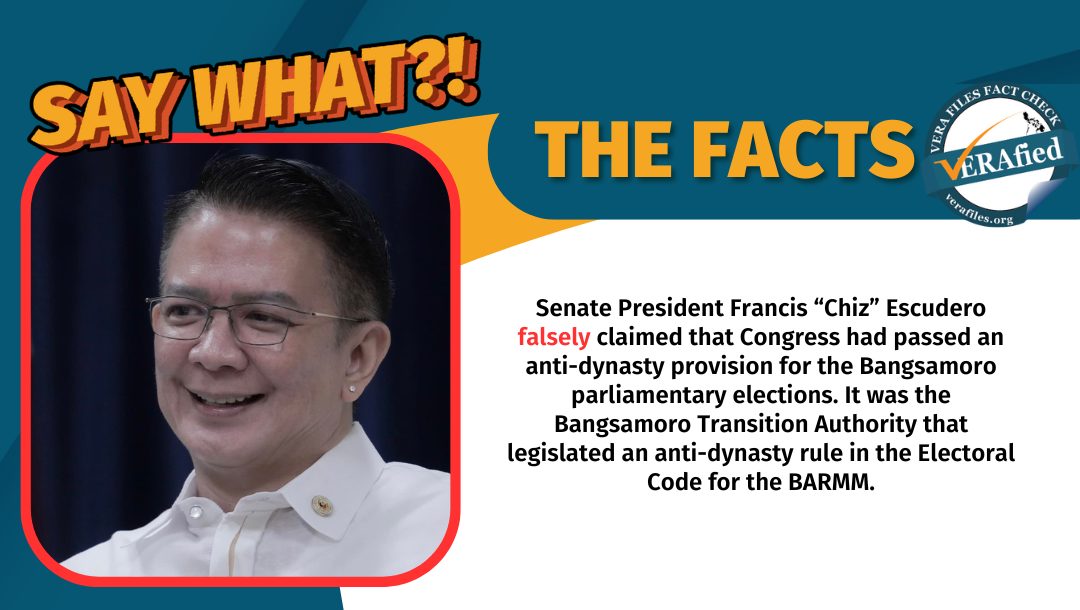Senate President Francis “Chiz” Escudero claimed that Congress had passed an anti-dynasty rule for the parliamentary election in the Bangsamoro Autonomous Region in Muslim Mindanao (BARMM).
This is false. The provision is contained in the Bangsamoro Electoral Code and a Commission on Elections (Comelec) resolution. As defined by the 1987 Constitution and the Bangsamoro Organic Law, neither the Comelec nor the Bangsamoro Transition Authority (BTA) are considered part of Congress.
STATEMENT
Commenting on the feasibility of prohibiting political dynasties at the national level, Escudero said in a press conference on Oct. 2:
“Within a particular territorial jurisdiction, Congress has passed a law on anti-dynasty, sa (in the) BARMM. For a particular sector, or those running for a particular sector like SK (Sangguniang Kabataan), Congress has done that, too. Pero sa pangkalahatan, hindi ganoon kasimple, dahil limitado ‘yan sa sektor… (But on the whole, it’s not that simple, because the rules are limited by the sector…).”
Source: Press Conference of Senate President Francis “Chiz” Escudero (October 2, 2024), Oct. 2, 2024, watch from 21:31 to 21:50
FACT
It was the BTA that legislated an anti-dynasty rule in the Bangsamoro Electoral Code, or Bangsamoro Autonomy Act (BAA) No. 35, enacted in March 2023.

The Senate bill creating the BARMM included an anti-dynasty provision, but it was not carried in the final bill Congress passed.
Article III, Section 9 (d) prohibits nominees of regional parliamentary political parties (RPPPs) who are related within the second degree of consanguinity or affinity. Violating nominees should be disqualified in a manner determined by the RPPPs.
Comelec Resolution No. 10984, issued last April 24, provides the implementing rules and regulations for the Bangsamoro Electoral Code.
RPPPs constitute 50% of the 80-seat parliament to be elected in May 2025.
During such time that the parliament is not yet elected, Article XVI of Republic Act No. 11054 or the Bangsamoro Organic Law mandated the BTA to exercise legislative authority. Executive functions, meanwhile, are temporarily overseen by an appointed chief minister.
The organic law enables the Bangsamoro Government (presently the BTA) to author and enact laws “on matters that are within [its] powers and competencies” independent from Congress.
In September 2023, ahead of the Barangay and Sangguniang Kabataan elections, the BTA approved the Bangsamoro Local Governance Code (BLGC) or BAA No. 49 that contained an anti-dynasty provision.
In Section 45 (g) of the BLGC, which enumerates the grounds for disqualification of local candidates, those who are related within the second degree of consanguinity or affinity are prohibited from running.
In the case of relatives vying for different positions, those running for lower office will be disqualified. Election authorities will draw lots for which candidate can continue in the case of relatives aspiring for the same position.
Get more insights:
Ask SEEK(Guided by the code of principles of the International Fact-Checking Network at Poynter, VERA Files tracks the false claims, flip-flops, misleading statements of public officials and figures, and debunks them with factual evidence. Find out more about this initiative and our methodology.)

